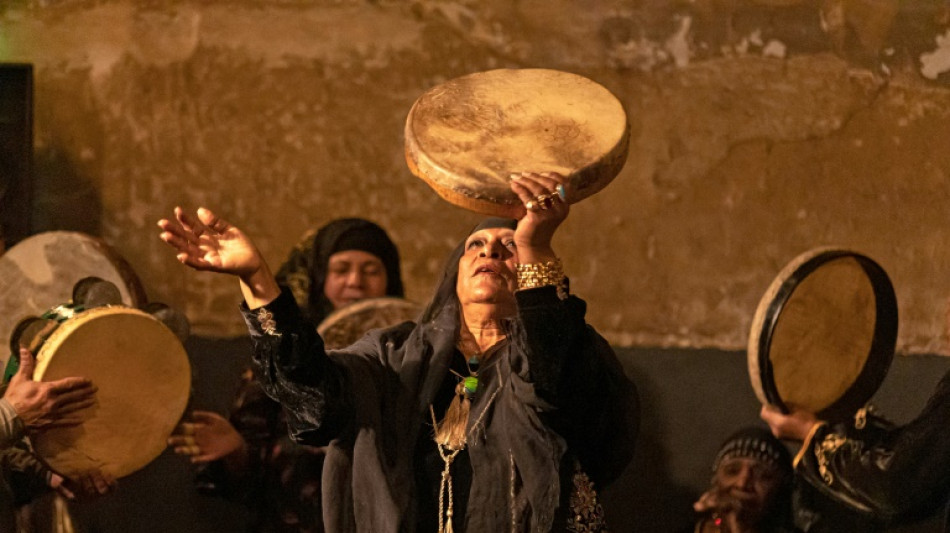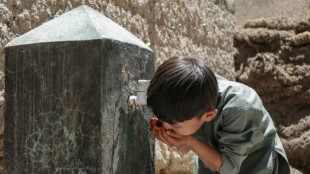
-
 Who is Lisa Cook, the Fed governor Trump seeks to fire?
Who is Lisa Cook, the Fed governor Trump seeks to fire?
-
Masters updates qualifying criteria to add six national opens

-
 New era unlocked: Taylor Swift and Travis Kelce announce engagement
New era unlocked: Taylor Swift and Travis Kelce announce engagement
-
Trump to seek death penalty for murders in US capital

-
 Taylor Swift and Travis Kelce announce engagement
Taylor Swift and Travis Kelce announce engagement
-
Swiatek swats Arango, Sinner launches US Open defence

-
 Swiatek swats Arango to reach US Open second round
Swiatek swats Arango to reach US Open second round
-
Tokyo-bound Duplantis, Lyles headline Diamond League finals

-
 Trump joins backlash against US restaurant Cracker Barrel
Trump joins backlash against US restaurant Cracker Barrel
-
US revokes visa of Brazil justice minister in Bolsonaro row

-
 Leverkusen sign former Real Madrid defender Vazquez
Leverkusen sign former Real Madrid defender Vazquez
-
India's Sindhu eyes medal on return to Paris for badminton worlds

-
 British rider Turner wins Vuelta sprint as Gaudu takes race lead
British rider Turner wins Vuelta sprint as Gaudu takes race lead
-
Sci-fi skies: 'Haboob' plunges Phoenix into darkness

-
 Liverpool face Isak dilemma ahead of Arsenal visit to Anfield
Liverpool face Isak dilemma ahead of Arsenal visit to Anfield
-
French political turmoil sends European stocks sliding

-
 Spain calls wildfires one of its worst disasters in years
Spain calls wildfires one of its worst disasters in years
-
Cadillac choose experienced duo Perez and Bottas for F1 debut

-
 Dortmund sign Chukwuemeka from Chelsea until 2030
Dortmund sign Chukwuemeka from Chelsea until 2030
-
EU claims 'sovereign right' to regulate tech after Trump threat

-
 Veterans Perez, Bottas to drive for Cadillac in debut F1 season
Veterans Perez, Bottas to drive for Cadillac in debut F1 season
-
Living in 'sin'? Ronaldo, Rodriguez highlight Saudi double standard

-
 Stocks drop on France turmoil, Trump's Fed firing
Stocks drop on France turmoil, Trump's Fed firing
-
Miyazaki overcomes 'anxiety' to win on badminton worlds debut

-
 Sri Lanka's jailed ex-president granted bail
Sri Lanka's jailed ex-president granted bail
-
Jennifer Lawrence to get San Sebastian Festival award

-
 The European laws curbing big tech... and irking Trump
The European laws curbing big tech... and irking Trump
-
Germany, Canada to cooperate on key raw materials

-
 Dortmund extend coach Kovac's contract
Dortmund extend coach Kovac's contract
-
Aid to famine-struck Gaza still 'drop in the ocean': WFP

-
 Japanese climber, 102, sets Mount Fuji record
Japanese climber, 102, sets Mount Fuji record
-
Israeli protesters call for hostage deal ahead of cabinet meeting

-
 Sinner, Swiatek, Gauff launch US Open title bids
Sinner, Swiatek, Gauff launch US Open title bids
-
US bids to trump China in DR Congo mining rush

-
 1 in 4 people lack access to safe drinking water: UN
1 in 4 people lack access to safe drinking water: UN
-
A cut above: new-look Alcaraz eases into US Open round two

-
 India's Election Commission under fire from opposition
India's Election Commission under fire from opposition
-
Typhoon death toll rises in Vietnam as downed trees hamper rescuers

-
 Kneecap cancel US tour, citing UK court hearing in terrorism case
Kneecap cancel US tour, citing UK court hearing in terrorism case
-
Venus Williams bows out of US Open as streamlined Alcaraz sails through

-
 Australia expels Iran ambassador over antisemitic attacks
Australia expels Iran ambassador over antisemitic attacks
-
A cut above: new-look Alcaraz eases past Opelka at US Open

-
 'The marshes are dead': Iraqi buffalo herders wander in search of water
'The marshes are dead': Iraqi buffalo herders wander in search of water
-
New Zealand fast bowler O'Rourke out for three months as injuries mount

-
 Deaths could spell end for Japanese boxing, says commission chief
Deaths could spell end for Japanese boxing, says commission chief
-
Battling Venus unsure of future plans after US Open exit

-
 Indian readies for punishing US tariffs
Indian readies for punishing US tariffs
-
Asian stocks down after Trump Fed firing, tariff threats

-
 Venus Williams, Keys bow out of US Open, Alcaraz launches campaign
Venus Williams, Keys bow out of US Open, Alcaraz launches campaign
-
Drones take on Everest's garbage


Egypt's ancient 'zar' ritual puts exorcism on stage
A stage, lights, a mesmerised audience: it looks like an Egyptian folkloric concert but Umm Sameh is singing to heal the sick by driving out the demons that possess them.
The music and dance ritual known as "zar", with centuries-old roots in Ethiopia and Sudan, is traditionally performed to ward off or exorcise jinn or evil spirits.
"We're not quacks or witches," said Umm Sameh, aged in her 70s, with kohl-lined eyes, large hoops swaying in her ears and gold bracelets tinkling on her arms.
"The singing is spiritual and brings out negative energies," said the lead singer of the Mazaher ensemble, adding that they also perform prayers from Islam's mystic Sufi practices.
Traditionally, the zar ritual would last several days and include animal sacrifices. But no blood is spilled at Cairo's Makan Cultural Centre, where the group performs to the delight of foreign and local guests.
The audience is bewitched by Umm Sameh's voice and nod their heads to the drumbeat.
In a patriarchal society where women face frequent discrimination, zar ceremonies are among the few cultural practices in which they take centre stage.
Umm Sameh said she learned the ritual from age 11 from her mother and grandmother.
Six decades later, she recites the same lyrics to the same tunes -- all from memory, she adds proudly, because she has "inherited them and grown up with them".
- 'Old healing ritual' -
"Zar is a very old healing ritual, a bit like medical treatment," said Ahmed al-Maghraby, founder of Mazaher, which he says is Egypt's last group to perform zar in public.
He set up the Makan performance space 22 years ago "to preserve this cultural heritage and archive local music from all over Egypt".
It was a tough feat, he said, because zar has historically been derided by devout Muslims as a pagan practice, and rejected by modernising state authorities as a backward rural tradition.
"Middle Eastern and Egyptian society regards everything local with disgust," lamented Maghraby.
He said it was foreign tourists who first brought Egyptians to the shows, who he remembered used to say "No! There's jinn and blood!'"
"For them, the zar was always something sinful."
Ensemble member Abou Samra said "people have a very negative idea of zar because of the movies," in Egypt, long regarded as the Hollywood of the Arab world.
In one of them, 1987 horror movie "Al Taweeza" (The Curse), superstars Youssra and Tahia Carioca contorted themselves, drenched in fake blood, and emitting shrill cries.
But zar is "an art like all other arts," said Abou Samra, who plays the tanboura, a six-string lyre. "We have to let go of these stereotypes."
- New generation -
Times are indeed changing. The ensemble, whose musicians and dancers were all over 60, have brought in a new member.
Azza Mazaher, who grew up watching her mother Umm Hassan do percussion, now also drums and energises the show as she dances across the stage.
Azza said the group now performs in both the old and new ways.
"If someone feels sick and the doctors can't find a treatment, we can hold a ceremony," she told AFP.
"But here, we're performing a light piece of folklore, so people can discover it, understand it and enjoy it."
Mazaher has taken part in several European festivals, and more Egyptians are flocking to their Cairo performances, appreciative of the home-grown artform.
Mariam Essawi, an audience member in her 20s, said: "They look like us, they represent us. Zar is part of our history and our cultural heritage. It's very strange that we don't know it."
S.Keller--BTB
